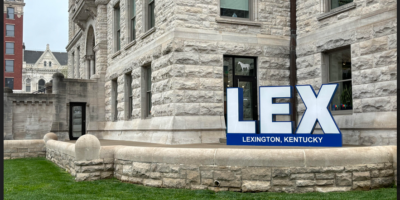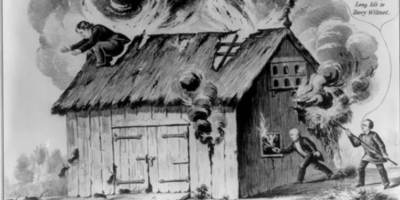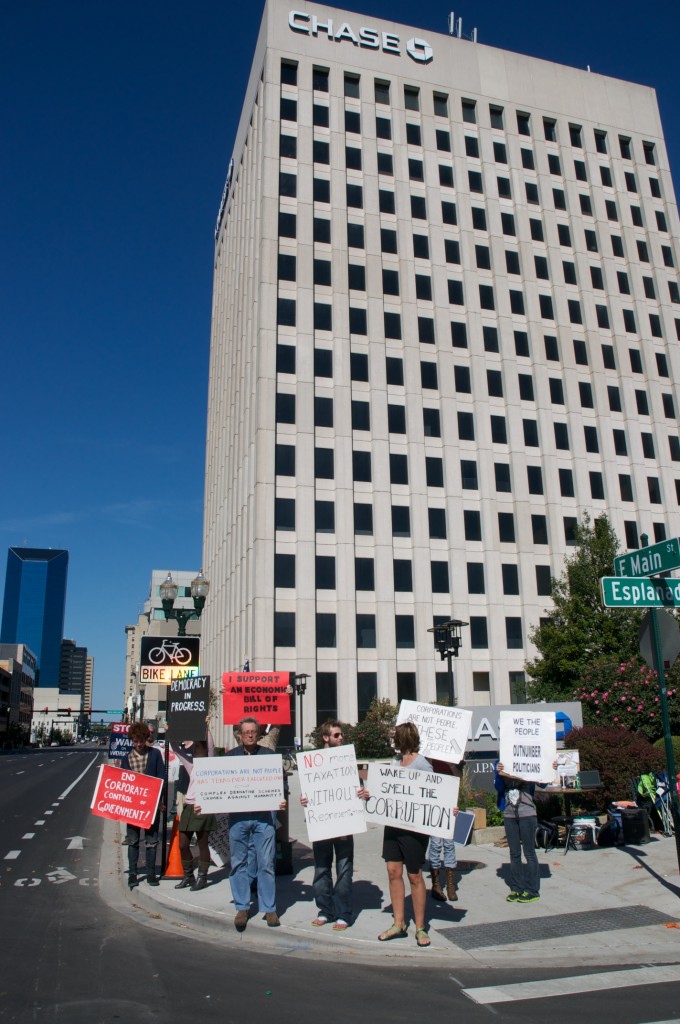Moving your money into local banks
By Austin Parker
I never thought too much about my bank. The fees seemed to stack a little higher every so often, and it was always a pain to get new checks, but I figured that this was merely the way of the world. Besides, I had more important things to worry about than the people taking care of my money—like actually making some money to put in there.
Three years ago, however, I started to think about my bank a lot. The financial crisis, whose roots traced back to the massive multinational banking and financial services industry, started to make me very curious about the organization I had put faith in to manage my deposits. What I began to learn was shocking—the relentless exposure to sub-prime loans, the pattern of increasing rates on Lines of Credit or special Balance Transfer programs without proper notification, and the black hole that their share of the $800 billion TARP bank bailout had seemingly disappeared into.
Frankly, I was disgusted. As more and more information leaked out about how the newly-coined “Too Big To Fail” banks were exposed to ludicrous amounts of complex financial instruments, bought and leveraged using my own money, I became even more so. I remembered a time when banks were smaller, community-focused institutions. I still have a picture of myself at age four, hauling a porcelain pig full of coins into our local savings bank and starting up an account with the teller and banker my parents had been using for fifteen years. On consideration, I couldn’t remember if I had ever seen the same teller twice at my current bank, and I certainly knew that they weren’t as involved in the community as that old banker had been.
Alternatives exist
Thankfully, we can still find those community banks, and credit unions, alive and well—in many cases, prospering. Websites such as the Move Your Money Project (www.moveyourmoneyproject.org) have assisted thousands in switching their accounts from the Too Big To Fail, Bailout-Banks, into responsible and more accountable local firms.
Why does it matter? There’s a concept in banking known as “core deposits.” The concept refers to the actual money being handed to the bank and placed on their balance sheets. For each dollar of core deposits a bank has, the effective stability of their lending dollars increases. In less wonky speak, the more money a local bank has, the more stable and confident it can be about its loan products—things like home mortgages, vehicle loans, and investments in small businesses.
I moved all my accounts over to a state-wide credit union, and couldn’t have made a better decision. They’ve given better customer service, more competitive rates for loans, and less fees than I ever saw at a big bank. Sure, they don’t have an iPhone app, or SMS alerts, or an ATM I can deposit checks into—but I can live without some minor convenience features in return for supporting local business and a better banking experience overall.
So, no iPhone apps, but plenty of other perks. In switching my account, I have begun to personally invest in the community around me. My deposits allow my state credit union to grow its deposits, which allows it to offer more loans to businesses starting out, or to new families trying to get a house. While the megabanks process loans in New York, Charlotte, or even India, the loan officers at my bank, as at other credit unions and community banks, are generally people I can call personally and meet with; since they live here, too, they are invested deeply in the community and are more likely to support the sort of investments that build us up as a community rather than the sort that build a cushy end-of-year bonus. And since my bank doesn’t benefit from rows of foreclosed homes, it is more eager to pursue loan modifications for people caught in a bad situation.
As a credit union member, I even have a stake in the bank itself. As at all credit unions, annual members meetings are held where I can attend and speak to the officers and executives of the bank, and offer ideas and feedback on their business plan. Compared to the proverbial smokey back-room dealings of the Wall Street fat cats who drove our economy off a cliff with speculative investments, this sort of personal touch and sense of ownership is a breath of fresh air.
Switching banks is easy
Switching banks is easy and painless. Deposit a small amount of money into the new bank to create your account, switch the direct deposit from your employer to the new account, and wait for your new checks and debit cards to arrive. In the meantime, use your old account as usual. Once the switchover is complete and you’re all set up with new cards and checks, you can either withdraw the remaining money from your old account and close it out, or use it normally until it has been depleted and then close it completely. If your old banks ask why you’re leaving, tell them “Too Big To Fail is Too Big For Me!”, or that you merely don’t appreciate your personal deposits backing up the gambles they’re making at the Wall Street Casino.
Don’t stop there, though. If you’ve got home or auto loans, see if you can have them serviced by your new bank as well. If you’ve got institutional accounts, such as for a small business, church, or nonprofit, ask your new bank how to switch those over as well! Unlike the gambling tables on Wall Street where tycoons sank our economy with reckless speculation and risky lending, everyone wins when you move your money to community banks.
Supporting Occupy Lexington
Speaking as an occupier, I’ve had so many people come by and ask what they can do to personally support us even though they can’t stay. Gladly, I’ve told them about moving their money—it’s something that almost all of us can do, and it does a lot more than one might think. Consider, briefly, that at the height of the financial crisis the big four banks had over $250 trillion leveraged against $5 trillion in deposits. Essentially, for each dollar you had in your checking account, they bet 50 times against that dollar in speculative gambles that came up short. Therefore, even the relatively small amount of money sitting in your checking account means an awful lot to how much the JP Morgan Chases of the world can risk. Contrast this with supporting community banks (and thus community lending), where you directly investin small business, helping them to expand.
The question, then, isn’t “Why haven’t you moved your money”, it’s “When are you going to move your money?” There’s a National Move Your Money Day scheduled for November 5th, which might be too quick for some people to switch everything out, but that doesn’t mean you shouldn’t go ahead and start the process. Every paycheck that goes into these Too Big To Fail banks represents another boost to their bottom line, and is a tacit approval of their despicable business practices. Vote with your dollars, and send the message to these Wall Street tycoons – “Too Big To Fail, is Too Big For Me.” I’ll see you at the credit union.
For more information or to find a local bank, please see www.moveyourmoneyproject.org





Bruce Williams
I moved to a local bank a couple years ago. The Big Bank had torpedoed my IRA, given bonuses to their fat-ass execs and then taken Bail-out money. That was too much; there’s ne dealing with thieves. The local bank pays only about 1%, but I had to stop the bleeding, and it’s a good thing.